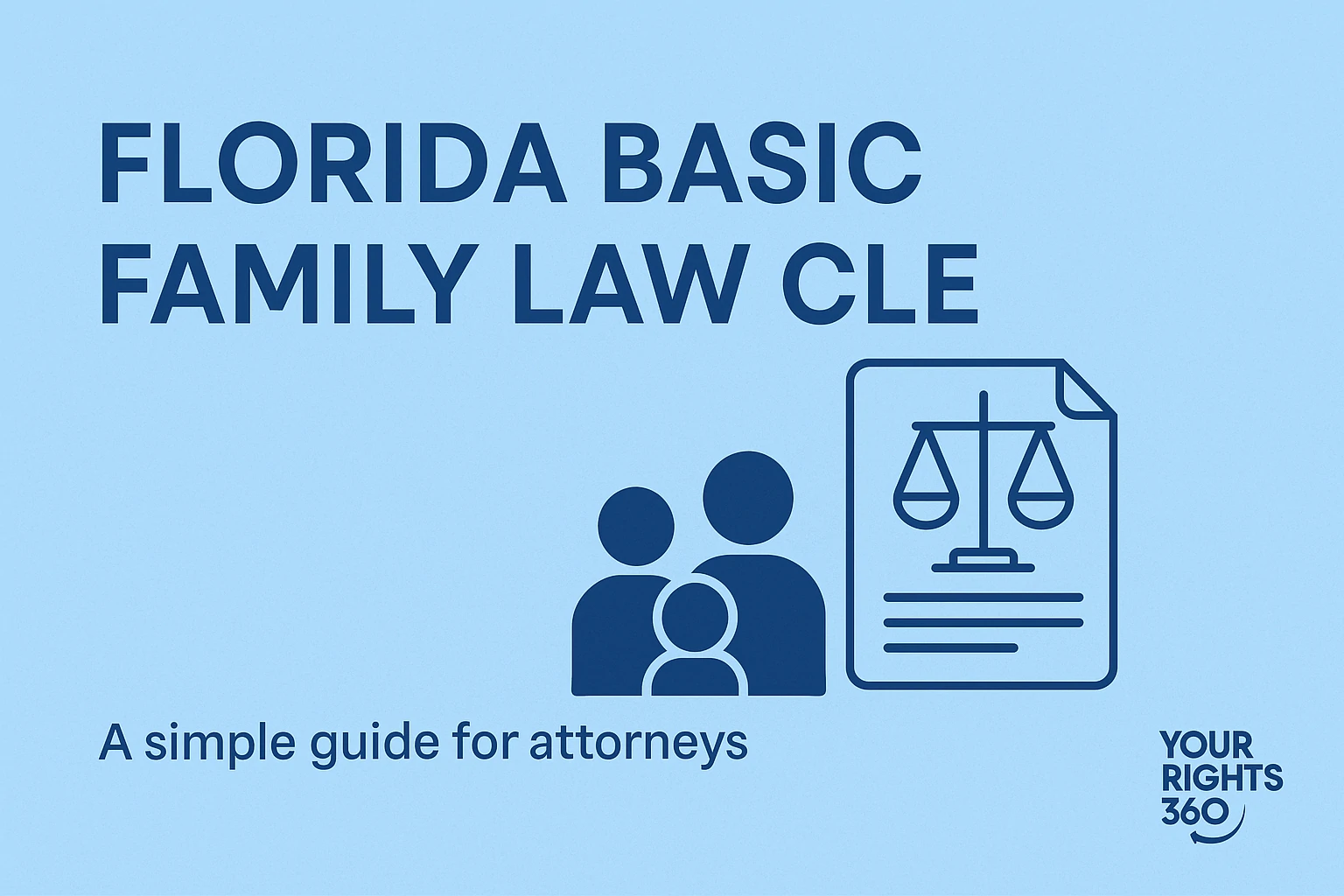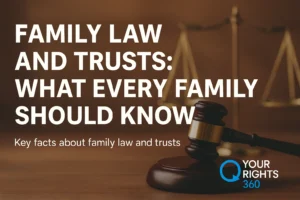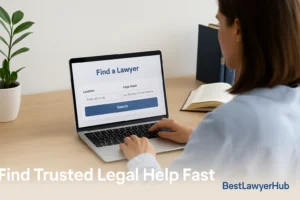Florida family law deals with real people and real emotions. Issues like divorce, custody, and support touch lives every day. Attorneys in this field must stay sharp and updated. The law changes. New cases shift the rules. Judges expect lawyers to know the latest.
Continuing Legal Education (CLE) helps meet that need. Florida requires lawyers to complete CLE credits every year. Family law has its own set of essentials. The Florida Bar designs programs to teach the basics and beyond. Every attorney who handles family cases must follow this track.
Basic family law CLE does more than teach. It shapes better advocates. It helps lawyers serve clients with clarity and care. It also reduces errors in court filings, hearings, and negotiations. Clients trust lawyers who know the rules and act fast.
This article explains what Florida basic family law CLE covers. It breaks down required topics, key skills, and how to choose the right course. Whether you are new or experienced, CLE will help you improve your practice.
What Does Family Law Include in Florida?
Family law in Florida covers many legal matters. It includes marriage, divorce, custody, support, property division, and domestic violence. Lawyers also handle adoption, name changes, and paternity cases. Each type follows its own rules.
Florida courts use the term “dissolution of marriage” for divorce. The process includes forms, deadlines, and financial disclosures. Custody cases now use the term “time-sharing” and follow a parenting plan. The court always looks at the child’s best interest.
Support cases include child support and alimony. The state uses a strict formula for child support. Alimony depends on marriage length, income, and need. These cases often require court hearings and mediation.
Property cases involve dividing assets and debts. Florida uses the rule of equitable distribution. That means a fair split, not always equal. Lawyers must know how to list and value all assets before trial.
Every family law topic requires legal skill. The Florida Bar CLE courses cover each area in detail.
Florida CLE Requirements for Family Law
Florida lawyers must complete 33 CLE credit hours every three years. At least five hours must cover ethics, professionalism, substance abuse, or mental health. One hour must focus on professionalism. Some lawyers need extra hours if they hold certifications.
Family law CLE helps lawyers meet those requirements. The courses are not just extra, they are vital. The Florida Bar tracks credits through an online portal. Lawyers must report all completed hours before the deadline.
Many family law CLE programs count toward board certification. The Florida Bar offers certification in marital and family law. That status shows a lawyer has deep experience. To qualify, lawyers must take approved CLE in family law.
Failure to complete CLE can lead to penalties. The Bar may suspend a lawyer’s license or charge fees. Missing credits can also delay certification or renewal.
What to Expect in Basic Family Law CLE Courses
Basic CLE programs cover the most common topics in family law. The course usually starts with an overview of Florida statutes and court procedures. It then moves to real case examples and sample filings.
You will learn about the divorce process from start to finish. This includes preparing forms, serving papers, and responding to motions. The course explains mediation rules and how to write a parenting plan.
CLE also teaches how to calculate child support. You will review worksheets and see how courts apply the formula. The course also explains the types of alimony and when courts award each one.
Time-sharing and custody issues take a large part of the program. You will learn how judges decide parenting schedules. Speakers explain what makes a strong parenting plan and how to defend it in court.
You also learn how to protect clients from domestic violence. The course shows how to file injunctions and what proof is needed. It explains the hearing process and common court outcomes.
CLE Skills That Help in the Courtroom
CLE courses do not just focus on law—they teach courtroom skills too. You will learn how to write clear pleadings and use court-approved forms. Speakers share tips on how to present a case in front of a judge.
The course covers how to use evidence in family law cases. You learn how to collect and show financial records, photos, and text messages. The goal is to tell your client’s story with proof, not just words.
You also gain insight on how to speak to judges and court staff. Tone, timing, and clear language matter. One strong court appearance can shape the outcome of a case.
CLE also builds your confidence in mediation. Most Florida family courts require mediation before trial. The course teaches how to prepare for mediation, guide clients, and close deals that work.
Choosing the Right Family Law CLE Course
You can take CLE courses in person or online. Some lawyers like live seminars with Q&A. Others prefer self-paced online videos. Both count toward your CLE credits.
Choose courses from trusted providers. The Florida Bar offers many on its official site. Some law schools and legal groups also offer approved CLE. Check that the course counts toward family law credit before you sign up.
Look for courses with strong reviews. Pick programs led by judges, board-certified lawyers, or seasoned experts. A good course should include handouts, sample forms, and practice tips.
Price also matters. Some CLE programs charge high fees. Others offer bundles or discounts. Choose what fits your budget and schedule, but never skip quality.
You can also review real-world examples of skilled family law firms, such as Minyard Morris Family Law LLP, to see how experienced attorneys apply advanced legal skills in practice.
How CLE Improves Your Law Practice
CLE does more than check off a list. It shapes your skills and your career. Clients see the difference in how you talk, file, and fight for their rights. Judges notice when a lawyer knows the rules and stays on time.
Good CLE improves your legal writing. It helps you spot mistakes before they cost your client. It teaches you how to explain the law in simple words your client can trust.
CLE also builds your reputation. A lawyer who stays updated earns more respect. Word spreads when you win cases and act with skill.
New lawyers gain the basics fast. Experienced lawyers refresh old skills and learn the latest trends. Every year brings new case law and new tools. CLE keeps you sharp and ready.
Advanced CLE: What Comes Next?
After you complete the basic course, move to advanced CLE. These programs dive deep into niche topics. You may find courses on high-conflict custody, international divorce, or military pensions.
Advanced courses often include mock trials or role play. You may argue a fake case in front of a real judge. That kind of hands-on training beats books and lectures.
You can also take CLE that helps with board certification. Florida has strict rules for certification in family law. Advanced CLE helps you meet those goals and boost your legal status.
Even if you do not plan to certify, advanced CLE makes you better. It gives you tools to take on tougher cases with skill and speed.
Tips to Make the Most of CLE
- Take notes during each session
- Download and keep course materials
- Ask questions when possible
- Apply one new skill in your next case
- Track your credits in your Florida Bar account
- Review your CLE needs before the deadline
Do not wait until the last year to meet your credits. Spread courses across time. This gives you room to reflect and grow.
Common Questions
Q. What does “basic” CLE cover?
It teaches divorce, custody, support, and court rules. The course gives new lawyers a strong start in family law.
Q. Who should take family law CLE?
Any lawyer who works on family cases should take it. The course helps meet credit rules and improves daily practice.
Q. Where can I find CLE courses?
The Florida Bar website lists approved programs. Law schools and legal groups also offer trusted options.
Q. What if I miss my CLE credits?
Missing credits can lead to fees or license trouble. The Bar expects lawyers to finish and report hours on time.
Conclusion
Florida basic family law CLE is more than a rule. It is a key to better results, smoother court actions, and stronger client service. Each course keeps lawyers sharp, focused, and ready. These lessons help reduce mistakes, speed up court steps, and bring fair outcomes. A lawyer who learns often can lead with more skill and care.
Family law affects real people in deep and personal ways. It deals with children, property, marriage, and safety. Clients do not just need legal answers, they need calm, clear support. A well-trained lawyer offers that support with confidence. CLE gives the tools to meet those needs with care.
Whether you are fresh out of law school or twenty years into practice, you never stop growing. The law changes. So do court systems, forms, and public needs. CLE keeps you on track and ahead. It helps you gain respect from peers, judges, and clients.
Invest in yourself. Take courses that teach and inspire. Learn new skills, fix old habits, and raise your standard. Florida family law CLE builds more than credits. It builds trust, skill, and strength in every lawyer who takes it seriously.
Disclaimer: This content is for general i0nformation only and is not legal advice. Consult a qualified attorney for guidance on your situation. Your Rights 360 makes no guarantee of accuracy or completeness.




